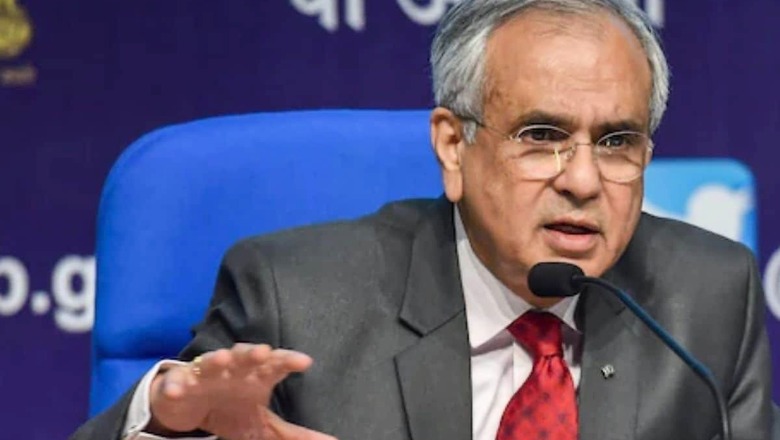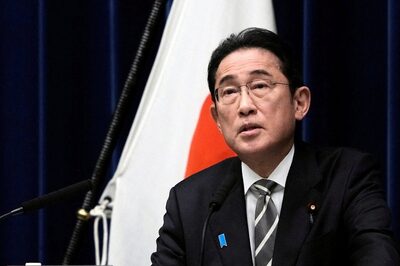
views
There is a need for a localised focus on covid-19 restrictions, NITI Aayog Vice-Chairman Rajiv Kumar on Wednesday said, adding that the national lockdown imposed last year helped prepare infrastructure and resulted in mitigating economic loss and migration in the second wave.
In an exclusive interview with CNN-News18, Kumar said, ?the national lockdown was imposed last year because we needed time to prepare the infrastructure and create awareness about the big calamity facing us and what we needed to do at that time. The steps gave huge returns as it contained the spread, mortality, amplified infrastructure facilities, PPE kits, labs, etc. Now having that structure in place, we need a more localised focus which the Niti Aayog has been advocating for a while and is being currently implemented.?
Kumar said the localised focus has led to better outcomes as all economic activities have not come to a halt, and the level of migration has also been reported much less.
With more than 533 districts in the country reporting a positivity rate of more than 10 percent in the rapidly spreading second covid wave, experts have pointed that a national lockdown for 2-3 weeks is needed to contain the transmission. However, noting that the numbers have dropped to two hundred, Kumar citing the example of districts that have reported more than 50 per cent positivity rate, said stringent measures need to be taken where the positivity rate is more as compared to areas reporting lesser cases. ?Can?t use measures for one situation for all the other areas.?
Attributing to the surge in figures, Kumar said quarantine measures were followed in district and state levels last time and played a huge role in containing the virus. ?We let our guard down by not ensuring institutional quarantine this time and the infections increased. So attributing this surge to localised approach is wrong.?
On allowing infrastructure projects amid the pandemic, Kumar pointed core infrastructure projects, including ports, roadways, real estate housing etc., are key for the revival of the economy. ?The infra industry has five times more employment elasticity than average employment and has a huge multiplier effect. With construction projects, lots of allied industries get benefited. We can not do a US 1.3 trillion dollar stimulus given the fiscal scope. We need sustainable employment.?
?When you boost consumption during supply constraints, it only results in inflation. Under PM-Kisan Yojana, money has been given to most affected,? he added.
This government has been so conscious in improving the health infrastructure: Rajiv Kumar (@RajivKumar1), Vice-Chairman, @NITIAayog.Watch #TheRightStand with @AnchorAnandN. pic.twitter.com/Ytl8xeCdUz
? News18 (@CNNnews18) May 19, 2021
Defending the controversial decision to continue the Central Vista Project, Kumar said the amount spent on the project is not even a drop compared to the money invested in the health sector. ?We have underinvested in health sectors for decades now. Our expenditure on AIIMS is up 200 per cent. We have expanded the infrastructure so much, but yet it is falling short. This is politicized. The government gave health insurance to 500 million people under the Ayushman Bharat scheme.?
Coming to the need to ramping up medical services, Kumar said the government replaced the Medical Council of India with the National Medical Commission. ?MCI was reluctant to expand the number of seats. Since then, a 70 percent increase in medical seats and states has brought incentives to attract medical professionals.?
With the opposition accusing the Centre of being under-prepared for the second surge, Kumar termed the situation as a grim reality the country had to face. ?The government has taken extraordinary steps to ramp up the production of oxygen and transportation of supplies. Due to the hard work of a lot of people, we were able to contain the peak. The second wave took us by surprise, but we have responded very well. Now the supply-demand situation is much better,? he said.
On the impact on the economy amid the covid-19 pandemic, Kumar said India?s reserves have risen due to record high FDIs in 2021. ?Our exports between January and March has been the highest ever even in Indian export history. This will become a major driver in our economic recovery,? he said.
?This was capable because of the reform put in place to ramp up our private investment. The government is also applying policies to ramp up the private expenditure,? he added.
Read all the Latest News, Breaking News and Coronavirus News here. Follow us on Facebook, Twitter and Telegram.




















Comments
0 comment